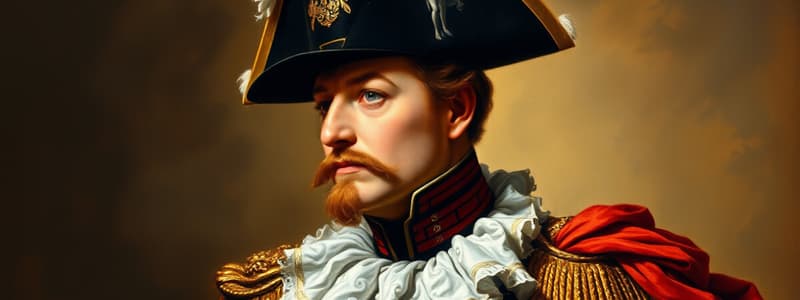Podcast
Questions and Answers
Napoleon crowned himself emperor of Italy in 1804.
Napoleon crowned himself emperor of Italy in 1804.
False (B)
The Confederation of the Rhine was initially made up of 16 German states.
The Confederation of the Rhine was initially made up of 16 German states.
True (A)
Napoleon's military operations against various alliances ended in 1799.
Napoleon's military operations against various alliances ended in 1799.
False (B)
Admiral Nelson defeated Napoleon at the Battle of Waterloo.
Admiral Nelson defeated Napoleon at the Battle of Waterloo.
The Peninsular Wars occurred between 1807 and 1814.
The Peninsular Wars occurred between 1807 and 1814.
Austria and Prussia were members of the Confederation of the Rhine.
Austria and Prussia were members of the Confederation of the Rhine.
Napoleon's invasion of Russia took place in 1812.
Napoleon's invasion of Russia took place in 1812.
The Continental Blockade was launched by France to enhance trade with Britain.
The Continental Blockade was launched by France to enhance trade with Britain.
Napoleon's army successfully defeated the Russian troops and secured a victory in Moscow.
Napoleon's army successfully defeated the Russian troops and secured a victory in Moscow.
The coalition that defeated Napoleon included England, Prussia, Russia, and Austria.
The coalition that defeated Napoleon included England, Prussia, Russia, and Austria.
Napoleon ruled as emperor of France for 200 days after his escape from Elba.
Napoleon ruled as emperor of France for 200 days after his escape from Elba.
Napoleon's severe treatment of the pope did not impact his popularity among Catholics.
Napoleon's severe treatment of the pope did not impact his popularity among Catholics.
The failure of the Russian campaign improved Napoleon's reputation and strengthened his army.
The failure of the Russian campaign improved Napoleon's reputation and strengthened his army.
The Code Napoleon was introduced in 1804 and was based on Enlightenment principles.
The Code Napoleon was introduced in 1804 and was based on Enlightenment principles.
Napoleon's rule played a significant role in the end of feudalism and the rise of capitalism in Europe.
Napoleon's rule played a significant role in the end of feudalism and the rise of capitalism in Europe.
Napoleon's vision for Europe was limited solely to military conquests.
Napoleon's vision for Europe was limited solely to military conquests.
Most of Napoleon's army returned safely to France after the Russian campaign.
Most of Napoleon's army returned safely to France after the Russian campaign.
The new national forces that emerged at the fall of the monarchies fully supported Napoleon's political arrangements.
The new national forces that emerged at the fall of the monarchies fully supported Napoleon's political arrangements.
Flashcards are hidden until you start studying
Study Notes
The Rise of Napoleon Bonaparte
- Following the French Revolution, the monarchy was abolished, and the Directory was established, prompting alarm among European monarchies.
- Napoleon Bonaparte emerged as a military leader, known for his exceptional generalship during the Revolution.
- In 1799, Napoleon overthrew the Directory and founded the Consulate, becoming the first consul among three to lead France.
- He initiated military campaigns against various European coalitions opposing France's expansion.
- By 1804, Napoleon crowned himself emperor at the Cathedral of Notre Dame, establishing the First French Empire.
Napoleon's Wars and Key Battles
- Between 1801 and 1812, Napoleon expanded French control over most of Europe before losing most territories by 1815.
- The Battle of Trafalgar (1805) resulted in a significant defeat for Napoleon against Admiral Nelson's British fleet.
- In response to British maritime dominance, he implemented the Continental Blockade (1806) to disrupt trade with Britain.
Confederation of the Rhine
- Napoleon's victory at the Battle of Austerlitz (1806) led to the formation of the Confederation of the Rhine, comprising 16 German states, later expanded to 35.
- Austria and Prussia opted out of this Confederation, established to unify German states and centralize administration akin to Napoleon's empire.
The Peninsular Wars
- Napoleon invaded Spain and Portugal (1807-1814) due to their non-compliance with the Continental Blockade, a campaign that drained resources and manpower.
- This prolonged conflict is referred to as Napoleon's "Spanish Ulcer."
The Russian Campaign
- Napoleon's invasion of Russia in 1812 with a large army faced strategic withdrawal by Russian forces, destroying resources and villages.
- The harsh winter and logistical failures forced a disastrous retreat, resulting in massive casualties and significantly weakening his army.
The Battle of Waterloo and Downfall
- A coalition of England, Prussia, Russia, and Austria defeated Napoleon, leading to his exile to Elba.
- After a brief return to power known as the Hundred Days, he was decisively defeated at the Battle of Waterloo (June 1815) by the Duke of Wellington.
- Napoleon was subsequently exiled to Saint Helena, where he died in 1821.
Causes of Napoleon’s Downfall
- Military campaigns stoked discontent and resentment across Europe, leading to costly losses in human lives and treasure for France.
- His harsh treatment of the pope alienated Catholic support, and dispossessed monarchs resented his ascendancy.
- Nationalist sentiments that arose post-monarchy were overlooked in Napoleon's political arrangements.
- The failed Russian campaign greatly diminished his army and reputation, weakening his grip on Europe.
Impact of Napoleon's Rule
- Napoleon’s ambition for a unified European Empire was inspired by historical figures like Alexander the Great.
- He instituted the Code Napoleon in 1804, establishing legal reforms based on liberty, equality, and fraternity across conquered territories.
- This legal code facilitated a unified administration and became a foundation for modern European legal systems.
- Together with the French Revolution, Napoleon's rule ended feudalism in France, redistributing land from the Church and nobility, and paving the way for capitalism.
Studying That Suits You
Use AI to generate personalized quizzes and flashcards to suit your learning preferences.




